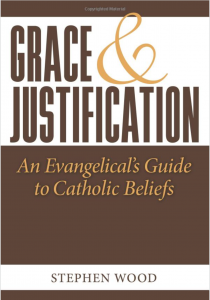Steve Wood was a Protestant pastor before converting to Catholicism and starting Dads.org. He has published an excellent book “Grace & Justification: An Evangelicals Guide to Catholics Beliefs.”
Steve’s latest newsletter summarizes some of his book and gives good insights — especially in this 500th Anniversary of the Protestant Revolt. This would be a good thing to share with your Evangelical friends or those who may have left the Church.
Here is his newsletter article: “Two Words that Unlock the Catholic Understanding of Justification”

-
Save
While Catholics don’t deny that there’s a forensic nature to justification, they believe that there’s a more profound change that occurs in justification than just going from guilty to not guilty.
In the Catholic understanding of justification, God is primarily viewed as a father. The sinful person is forgiven and restored to the family fellowship as a child of the Heavenly Father, just like the prodigal son in Luke 15.
This restoration as a son of God is called adoption, which is the central truth in Catholic beliefs on justification. Divine adoption is the inconceivably merciful and gracious acceptance of those justified into the divine family and a sharing of kinship with God the Father.
The Council of Trent gave a summary of justification as follows:
“The justification of the sinner [is] a translation from that state in which man is born a child of the first Adam, to the state of grace and of the adoption of the sons of God through the second Adam, Jesus Christ, our Savior.”
Similarly, section 1996 of the Catechism of the Catholic Church on justification, highlights becoming a child of God as a key aspect of justification:
“Our justification is by the grace of God. Grace is favor, the free and undeserved help that God gives us to respond to his call to become children of God.”
Protestants believe in adoption, but as separate and subsequent to justification. Catholics believe adoption is the core of justification and a central concept of faith….”
For the whole article like HERE. To see or buy his book, click HERE.



This Post Has 2 Comments
"While Catholics don’t deny that there’s a forensic nature to justification, they believe that there’s a more profound change that occurs in justification than just going from guilty to not guilty."
The author paints with a broad brush. The assumption that not-Catholic Christians don't hold to the same concepts in both halves of the sentence quoted above is disingenuous.
STEVE RAY HERE: The author paints with a broad brush because he’s covering a wide swath of Protestantism. He is speaking in generalities which is completely proper and acceptable in the context. The fact that protestants do not believe as Catholics do on justification is quite clear. All one has to do is pick up the average Evangelical Protestant or liberal Protestant or any other theology and they will find that the author is correct.
It would be interesting to see where one can find in the Reformers anything that looks like Catholic teaching. The Reformers knew that they were breaking with 1500 years of precedent which is exactly why the first part of the word is “protest.”
“The Reformers knew that they were breaking with 1500 years of precedent which is exactly why the first part of the word is “protest.””
The word ‘protest’ has had a history something like that of the word ‘apology’. In common use, that word has evolved from a positive sense: “a formal justification or defense” as in ‘apologetics’ … to a statement of regret or request for pardon.
At he time of the Diet of Speyer in 1529 The word ‘protest’ had an affirmative connotation… similar to the word ‘testament’.
The use of the word ‘protest’ to mean “statement of disapproval” was first recorded 1751…
The appeal to Charles V affirmed that “they must protest (* make a solemn declaration) and testify publicly before God that they could do nothing contrary to His word”.
According to the Online Etymological Dictionary… etymonline:
protest (n.)
c. 1400, “avowal, pledge, solemn declaration,” from Old French protest (Modern French prôtet), from preotester, and directly from Latin protestari “declare publicly, testify, protest,”
from pro- “forth, before” (from PIE root *per- (1) “forward,” hence “in front of, before”)
+ testari “testify,” from testis “witness”.
The above was the accepted meaning into the Elizabethan era as well. Its accepted meaning was not “objection” … but “avowal” or “witness” or “confession” as the Latin protestari, meant also “to profess”.
According to the same source:
The use of the word ‘protest’ to mean “statement of disapproval” was first recorded 1751…
almost 300 yrs after the Second Diet of Speyer in1529.
It was about 60 years from the introduction of the term’ Protestant’ into English until its first use in the extended sense of “object, dissent, or disapprove.”
Comments are closed.